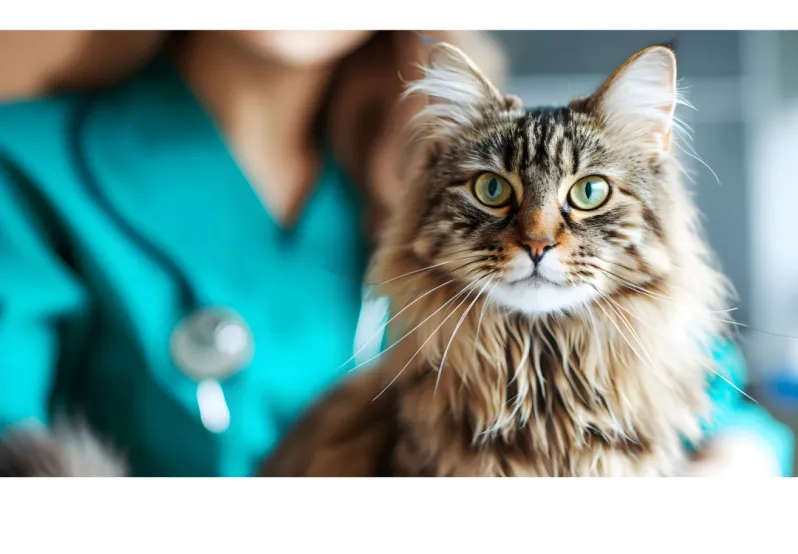Effect of Porus One on Reducing Uremic Toxins in Cats with Chronic Kidney Disease (CKD)
At the time of screening, a complete history of diet and medications will be discussed. Your cat will receive a physical examination and comprehensive laboratory screening to confirm stage of CKD and exclude other newly diagnosed conditions (e.g. hyperthyroidism, hypertension). This will also be the first time you fill out a quality-of-life survey and provide a fecal sample you have collected from your cat. You cat will need to be in the same fed state for every visit (either fasted or fed).
After confirmation of enrollment, your cat will be randomized to start in one of the groups. This is a 16-week crossover study, meaning each cat will be in either the Porus One + standard of care group, or standard of care only group for 8 weeks and then cross over to the opposite group. Porus One will be administered sprinkled into wet food or cat snack (e.g. Churu) once a day for a total of 8 weeks. Administration should be greater than two hours from the time other medications are given.
The study team will check in with you every two weeks by email or phone to address any questions or concerns. No changes in medication or diet should be made during the study without discussing first with the study team.
Uremic toxins are substances that build up in the body due to decreased removal by the kidney. They are increased in patients with CKD and correlate to severity of disease. Indoxyl sulfate is one of the most studied uremic toxins and comes from byproducts of protein metabolism in the gut. It is thought to contribute to progression of CKD including increasing fibrosis and inflammation in the kidney as well as affecting other body systems such as the heart, bones, and muscle. Porus One (Renaltec) is a new patented pure carbon product that acts as an adsorbent of the protein byproduct so that it cannot be absorbed and converted into indoxyl sulfate. Instead, it is excreted in the feces. Porus One has been shown to decrease indoxyl sulfate in normal geriatric cats. The purpose of this study is to assess its effect in cats with CKD.

Client Compensation:
There is no cost to you for enrolling your cat in this study. Your cat will receive complimentary assessment and management of disease overseen by a board-certified specialist in feline CKD as well as standard of care laboratory monitoring regardless of study group. Cats may benefit from this therapy and can continue it after the study at the caretaker's expense.
Potential Medical Benefits:
Your cat will receive complimentary assessment and management of disease overseen by a board-certified specialist in feline CKD as well as standard of care laboratory monitoring regardless of study group. Cats may benefit from this therapy and can continue it after the study at the caretaker's expense.
Potential Medical Risks:
Your cat may experience transient stress of being in the hospital and mild discomfort of having blood drawn. If you cat is excessively stressed at any time, we will not continue with drawing the study samples. Gabapentin may be given to alleviate stress associated with visits and sample collection. If this is not effective, we will discuss with you whether continuing the study is in your cat's best interest. A blood draw can result in bruising at the site of the blood draw. In rare cases, using a needle to collect urine directly from the bladder may result in hematuria (bloody urine), nausea or very infrequently bladder rupture. Your cat will be observed closely for side effects and appropriate medical care will be provided. No significant drug-related adverse events have been identified to date with Porus One, it is not systemically absorbed and stays in the GI tract. Stool color may darken as a result of Porus One product. Adding the product to the food might affect consumption, so this will be monitored closely, and your cat may be removed from the study for its best interest if this is a concern. In the unlikely event that an adverse event that requires treatment occurs as a result of taking part in this study, the cost of treatment will be covered by the study.
What qualifies my pet for enrollment?
Inclusion Criteria:
- Cats with stable IRIS stage 2-4 CKD (serum creatinine ≥ 1.6 - 8.0 mg/dL) that are willing to eat the product in wet food are potentially eligible to participate.
Exclusion Criteria:
- Other uncontrolled systemic illnesses.
- Complications of CKD such as kidney infection or ureteral obstruction.
- Severe anemia (PCV < 20%)
- Decompensated CKD requiring hospitalization and intravenous fluid therapy.
- Other concurrent therapies such as dietary management, potassium supplementation, anti-hypertensive medications.
- (Subcutaneous fluids are acceptable if they were initiated at least 14 days prior to enrollment and are given consistently throughout the study period.)
- (Subcutaneous fluids are acceptable if they were initiated at least 14 days prior to enrollment and are given consistently throughout the study period.)
- No antibiotics administered within 8 weeks of enrollment.
- No prebiotics/probiotics or significant diet changes within one month of enrollment.
Diagnosis/Condition Being Studied:
Feline Chronic Kidney Disease (CKD)
Intervention to Be Studied:
Porus One
Primary Outcome:
Event(s) or variable(s) to be measured: Clinical parameters such as kidney values, weight, quality of life as well as uremic toxin concentrations in the blood.
Method(s) used to measure event(s) or variable(s): At each of the four visits during the 16-week study a physical exam, lab work, and quality of life score will be performed.
Anticipated endpoint/outcome: We anticipate a decrease in uremic toxin concentrations in response to administration of Porus One.
Pre-Screening Questionnaire
If you believe your pet may be eligible to enter this study, please fill out a pre-screening questionnaire.